Cardiology Research Unit
 The Cardiology Research Unit's research involves contributing to multi-centre trials, including trials of new devices for coronary angioplasty, and clinical trials of new drugs for management of heart attacks, cholesterol levels, and arrhythmia.
The Cardiology Research Unit's research involves contributing to multi-centre trials, including trials of new devices for coronary angioplasty, and clinical trials of new drugs for management of heart attacks, cholesterol levels, and arrhythmia.
Local research includes assessment of biomarkers as predictors of coronary stent re-stenosis after implantation.
The Research Unit is also performing a prospective study in patients with aortic valve disease evaluating what genes might be important in the development of narrowed heart valves in older persons.
Email medicine@otago.ac.nz
Web otago.ac.nz/dsm-medicine/research/otago046613.html
Mātai Hāora – Centre for Redox Biology and Medicine
(Formerly Center for Free Radical Research)

We carry out research on the regulation of oxidative stress and redox metabolism in cancer cells, and how these pathways may be manipulated to assist treatment.
Research Projects:
- Alterations in the redox metabolism of cancer cells during metastasis and the development of drug resistance
- Targeting the antioxidant systems of cancer cells
- Vitamin C and the regulation of cancer cell epigenetics
- Role of innate immune cells in the promotion and progression of cancer
- Regulation of cell death pathways
Email mark.hampton@otago.ac.nz
Web otago.ac.nz/christchurch/research/freeradical
Centre for Health, Activity and Rehabilitation Research (CHARR)
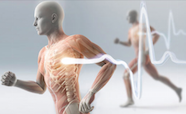 Alongside our high quality postgraduate and research programmes, research at the School of Physiotherapy is managed through our dedicated Centre for Health, Activity, and Rehabilitation Research. Research and knowledge transfer are integral parts of the School of Physiotherapy's activities.
Alongside our high quality postgraduate and research programmes, research at the School of Physiotherapy is managed through our dedicated Centre for Health, Activity, and Rehabilitation Research. Research and knowledge transfer are integral parts of the School of Physiotherapy's activities.
Research project areas:
- Physical Activity and Health
- Healthy Ageing
- Sports Concussion and Injury Prevention
- Clinical Biomechanics and Medical Technologies
Email donna.keen@otago.ac.nz
Web otago.ac.nz/physio/research
Centre for Health Systems and Technology
 The Centre for Health Systems and Technology (CHeST) has a particular focus on the applied end of health system and technology research, supporting the translation of research into practice.
The Centre for Health Systems and Technology (CHeST) has a particular focus on the applied end of health system and technology research, supporting the translation of research into practice.
CHeST features five core themes:
- Health Care Delivery
- Health System Architecture, Management, and Performance
- Health Quality, Safety, and Community Engagement
- Health Workforce
- Health Technology
Email chest@otago.ac.nz
Web otago.ac.nz/healthsystems
Centre for Translational Research
 The Centre for Translational Research (CTR) is a central research facility at the University of Otago, Wellington. It is designed to forge world-class research programmes that will accelerate the transfer of clinically-relevant scientific knowledge.
The Centre for Translational Research (CTR) is a central research facility at the University of Otago, Wellington. It is designed to forge world-class research programmes that will accelerate the transfer of clinically-relevant scientific knowledge.
Translation of non-clinical research that results in real world clinical applications is a major challenge for biomedical researchers. With increasing sub-specialisation in both medical and basic biomedical disciplines, such knowledge transfer can become fragmented unless concerted efforts are made to promote their integration. A hallmark of those involved in the CTR is a willingness to collaborate on projects which utilise both scientific and clinical expertise. This is in recognition of the importance we believe translational research provides in generating answers to clinical problems.
The following topics are of particular interest:
- Energy and metabolism
- Neurocritical care
- Cardiovascular genetics
- Exercise and environmental physiology
- Clinical physiology and biomedical engineering
- Paediatrics
- Acute and chronic airways disease
- Sleep medicine
Email ctr@otago.ac.nz
Web otago.ac.nz/uow-physiology
Christchurch Heart Institute
 Here at the Christchurch Heart Institute we help save thousands of lives through research into improved diagnosis, better prediction and advanced treatments for heart disease. Our team of internationally-renowned experts directly play a role in increasing the survival of New Zealanders with heart disease.
Here at the Christchurch Heart Institute we help save thousands of lives through research into improved diagnosis, better prediction and advanced treatments for heart disease. Our team of internationally-renowned experts directly play a role in increasing the survival of New Zealanders with heart disease.
Our research is focused on:
- New blood tests for heart attack diagnosis and prognosis
- Using new methods for treating heart failure and improving outcomes
- Understanding the genetics of heart disease; why heart disease runs in some families
Email chi@otago.ac.nz
Web otago.ac.nz/chch-heart-institute
D4 Network
 D4—Diagnostics, Drugs, Devices and Discovery focuses on translational research for improving care via:
D4—Diagnostics, Drugs, Devices and Discovery focuses on translational research for improving care via:
- Creating novel point-of-care diagnostics and devices enabling targeted and selective treatments
- Developing smart drug delivery systems and devices to improve and optimise therapy
- Drug discovery for innovative treatments
The network draws together the disciplines of bioengineering, pharmaceutical science and drug discovery with an emphasis on collaborating with commerce and industry.
Email joel.tyndall@otago.ac.nz
Web otago.ac.nz/d4
Genetics Otago
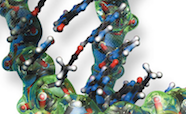 Genetics lies at the root of many human diseases. At Genetics Otago, we have a remarkable breadth of human genetics research studying both complex and single-gene diseases. As an example, researchers at the Cancer Genetics Laboratory are world-leaders in their field.
Genetics lies at the root of many human diseases. At Genetics Otago, we have a remarkable breadth of human genetics research studying both complex and single-gene diseases. As an example, researchers at the Cancer Genetics Laboratory are world-leaders in their field.
Our human developmental disease research provides an insight into how human embryos work, and how that is related to human health. We study both the genetics and epigenetics of human development and cell division.
Pharmocogenomics is another major area of research—this is a modern approach to understanding the side-effects of, and sensitivities to, drug treatments—by analysing the effect of a person's genes on their response to drugs.
Email go@otago.ac.nz
Web otago.ac.nz/genetics
Healthier Lives – He Oranga Hauora National Science Challenge
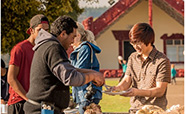 The Healthier Lives – He Oranga Hauora National Science Challenge is a national research collaboration dedicated to achieving healthier lives for all New Zealanders.
The Healthier Lives – He Oranga Hauora National Science Challenge is a national research collaboration dedicated to achieving healthier lives for all New Zealanders.
It undertakes collaborative research aimed at equitably improving the prevention and treatment of four major non-communicable diseases:
- Cancer
- Cardiovascular disease
- Diabetes
- Obesity
Our vision
He Oranga Hauora kitenga
Aotearoa hei whenua he ōrite ngā putanga hua hauora mō te tangata, kia iti iho hoki ngā pīkauranga o ngā māuiui kāore e taea te tuku ki te tangata kē.
Healthier Lives vision
New Zealand with equitable health outcomes and a substantially reduced burden of non-communicable diseases.
Many factors impact on the health of New Zealanders, including systems that affect the whole population, cultural factors that relate to particular communities, and the genetic make-up and life experiences of individuals.
Healthier Lives' research is therefore focussed within three themes:
- Healthy food and physical activity environments
- Culturally centred health interventions for Māori and Pacific peoples
- Precision medicine and personalised prevention
Email healthier.lives@otago.ac.nz
Web healthierlives.co.nz
Heart Otago
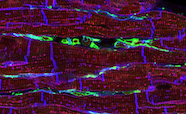 Heart Otago is comprised of cardiovascular researchers and clinicians located at the University of Otago and Dunedin Hospital. The goal of the group is to expand upon traditional cell and animal models to better understand the molecular nature of cardiac disease in patients with heart disease and to translate the laboratory-based cardiovascular research into the clinical setting.
Heart Otago is comprised of cardiovascular researchers and clinicians located at the University of Otago and Dunedin Hospital. The goal of the group is to expand upon traditional cell and animal models to better understand the molecular nature of cardiac disease in patients with heart disease and to translate the laboratory-based cardiovascular research into the clinical setting.
The strong link between fundamental researchers and clinicians allows the group to study cardiac disease from genetic mutations within a single protein, through tissue and animal models, to patients presenting with a range of cardiac anomalies.
Investigations involve a wide range of techniques including:
- Electrophysiology
- Cell imaging
- Genetic and biomarker screening
- Multicellular human tissue and whole animal heart function measurements
- Human and animal in vivo cardiac function via echocardiography
Email heart@otago.ac.nz
Web otago.ac.nz/heart-otago
Long-term condition management research
 The focus of this research group, in the Centre for Postgraduate Nursing, is the development of evidence-based healthcare to minimise the impact of chronic health needs on people's lives. Research explores symptom experience, risk assessment, preventative care and symptom control issues, with particular emphasis on the enhancement of patient self-management strategies.
The focus of this research group, in the Centre for Postgraduate Nursing, is the development of evidence-based healthcare to minimise the impact of chronic health needs on people's lives. Research explores symptom experience, risk assessment, preventative care and symptom control issues, with particular emphasis on the enhancement of patient self-management strategies.
Email mandy.wilkinson@otago.ac.nz
Web otago.ac.nz/christchurch/departments/nursing/research
Otago Genomics Facility
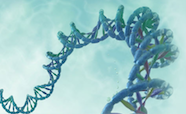 We provide expertise and sequencing resources to New Zealand researchers and industry including:
We provide expertise and sequencing resources to New Zealand researchers and industry including:
- Project design and advice
- Illumina HiSeq sequencing
- Illumina MiSeq sequencing
- Nanostring nCounter Analysis System
The Otago Genomics Facility is an Illumina Propel-certified service provider for Illumina HiSeq 2500 and MiSeq sequencing platforms, and is also a Nanostring nCounter Analysis System core facility.
Email genomics@otago.ac.nz
Web otago.ac.nz/genomics
Otago Micro and Nanoscale Imaging (OMNI)
 Four well-established and highly respected research-expertise providers have joined together under one umbrella to offer:
Four well-established and highly respected research-expertise providers have joined together under one umbrella to offer:
All the expertise, highly sophisticated instrumentation, and stellar support remains in place, as do the existing locations of services on our Dunedin campus.
The four units have collaborated on a new website as a central repository of their capabilities and achievements.
For all you need to know about what can be offered, who can help, what services, training, and specialist expertise and advice is available, please contact us.
Email omni@otago.ac.nz
Web otago.ac.nz/omni
Otago Vascular Diagnostics
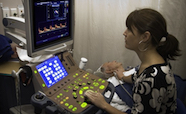 We are a team of vascular surgeons, technologists and research staff using various diagnostic investigations to research the causes and management of vascular conditions.
We are a team of vascular surgeons, technologists and research staff using various diagnostic investigations to research the causes and management of vascular conditions.
The unit provides clinical diagnostic services to the Southern District Health Board, and to the wider community, to assist in the diagnosis and treatment of vascular diseases such as:
- Deep vein thrombosis
- Carotid artery disease
- Peripheral vascular disease
- Aortic aneurysms
- Varicose veins and venous ulcer
Our services include:
- Medical imaging using ultrasound to capture real-time images of blood vessels and blood flow
- Physiological testing to measure how well the vascular system is functioning both during exercise and at rest
- Treatment of varicose veins and vascular malformations using endovenous laser therapy (EVLT) and sclerotherapy
The unit is part of the Vascular Research Group and works closely with other research groups at local, national and international levels.
Email ovd@otago.ac.nz
Web otago.ac.nz/dsm-surgery/research/otago-vascular-diagnostics/
Pharmacology and Toxicology
 Research at the Department of Pharmacology and Toxicology uses state-of-the-art technologies, including the use of in-vivo disease models, to undertake integrative, cellular and molecular investigations aimed at understanding animal and human pathophysiology (and to delineate targets for novel drugs).
Research at the Department of Pharmacology and Toxicology uses state-of-the-art technologies, including the use of in-vivo disease models, to undertake integrative, cellular and molecular investigations aimed at understanding animal and human pathophysiology (and to delineate targets for novel drugs).
Academic and research-support staff of the Department are engaged in high quality, internationally-recognised research focused on the following themes:
- Cancer Research
- Cannabionids and Neuropathic Pain Research
- Cardiorenal and Diabetes Research
- Free Radical Research
- Neuroscience Research
- Neurotoxins / Seizures / Stroke Research
- Seizures / SUDEP / Stroke Research
- Stroke
- Vestibular and Auditory Research
Email pharmacology@otago.ac.nz
Web otago.ac.nz/phal
Pharmacy
 The School of Pharmacy has a very active research programme with disciplines ranging from science to humanities.
The School of Pharmacy has a very active research programme with disciplines ranging from science to humanities.
We have three main research areas:
- Pharmaceutical Sciences: drug discovery, drug metabolism and drug action to extend the range of drugs available and to provide a scientific basis for the quality use of medicines and bioactive substances.
- Clinical Pharmacy: concerned with patient care and the optimisation of medicine use in order to promote health and wellness, and prevent disease.
- Social Pharmacy: our research focuses mainly on access to, and use of medicines.
Email pharmacy.research@otago.ac.nz
Web otago.ac.nz/pharmacy/research
Research Infrastructure Centre
 Our Research Infrastructure Centre offers specialist expertise, technology and facilities in protein research, genomics, imaging, and biomedical research.
Our Research Infrastructure Centre offers specialist expertise, technology and facilities in protein research, genomics, imaging, and biomedical research.
We support optimum design and analysis of your research, and provide skill development opportunities.
Our academic leadership is of the highest calibre and we have extensively experienced and skilled staff.
Our services are available to researchers in institutions, industry, government and private companies.
Email ric.admin@otago.ac.nz
Web otago.ac.nz/healthsciences/research/ric
Research in Pharmacoepidemiology (RIPE)
 The RIPE group uses real-world data to evaluate health outcomes at a population level. The group covers a broad scope of research investigating:
The RIPE group uses real-world data to evaluate health outcomes at a population level. The group covers a broad scope of research investigating:
- Drug utilisation
- Prescribing trends
- Prescription adherence
- Guidelines adherence
- Comparative effectiveness
Our researchers are keen in adopting initiatives to advance pharmacoepidemiological research.
Our research group is adept at using propensity score matching, marginal structural models, and disease scores risks.
Email ripegroup@otago.ac.nz
Web otago.ac.nz/ripe
Search the Health Sciences Expertise Database
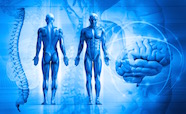 The Division of Health Sciences benefits from its high calibre of staff and their wide range of skills and research expertise.
The Division of Health Sciences benefits from its high calibre of staff and their wide range of skills and research expertise.
Our Staff Expertise Database provides details on University of Otago, Health Sciences staff. Each staff profile provides information on qualifications, current academic position, contact details, and a summary of research and publications.
You can search our database by keyword (eg cardiovascular) or by name.
Health Sciences expertise database
Stroke neurology
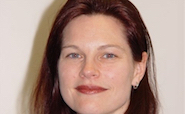
Professor Anna Ranta's research focuses on stroke epidemiology and service delivery optimisation, service integration, health equity and knowledge translation. She is a Consultant Stroke Neurologist with Capital, Coast, and Hutt Valley District alongside her roles as Head of the Department of Medicine and Professor of Neurology at University of Otago Wellington. She is also the Clinical Co-Director for the National Hyper-Acute Stroke Service.
Current research projects include:
- Developing a national stroke data strategy with Te Whatu Ora
- Co-designing community stroke interventions for Māori living in rural areas
- Ongoing work on the REGIONS Care Study including linking data with the Integrated Data Infrastructure (IDI)
- Co-leading a Health Research Council programme grant sub-study on IDI data linkage to determine nationwide stroke epidemiology as part of the ARCOS V Study
- Evaluating Telestroke models of care in the pre-hospital and post-discharge settings
- Assessing the FeSS (“Fever, Sugar, Swallow”) tool within NZ Stroke Hospitals
- Testing feasibility of stroke service support in Pacific Islands
- Assessing an Atrial Fibrillation electronic decision support tool
Professor Ranta is accepting enquiries for PhD opportunities.
Email anna.ranta@otago.ac.nz
Web otago.ac.nz/healthsciences/expertise/profile/index.html?id=2356
Vascular, Endovascular, and Transplant Surgery (VETS)
 Members are engaged in clinical and laboratory-based research in collaboration with established research groups at University of Otago, Christchurch, and the University of Canterbury.
Members are engaged in clinical and laboratory-based research in collaboration with established research groups at University of Otago, Christchurch, and the University of Canterbury.
Clinical research themes include:
- Prioritisation for surgery
- Vascular audit and continuous quality improvement
- Clinical decision modelling in vascular surgery (focused around abdominal aortic aneurysm)
- Wound management (in collaboration with Nurse Maude)
Our research includes collaborations with the University of Canterbury Centre for Bioengineering and Biological Sciences (The Growth Dynamics of Atherosclerotic Plaque) and the Angiogenesis Research Group (University of Otago, Christchurch) and the Department of Plastic Surgery (Skin cancers in renal transplant recipients).
Email surgery.uoc@otago.ac.nz
Web otago.ac.nz/christchurch/research/surgery/index.html#vascular
Wellington Cardiovascular Research Group
 Cardiovascular disease remains the leading cause of death, and a significant cause or morbidity in the western world. The Wellington Cardiovascular Research Group undertakes basic science projects, translational research and clinical research into ischaemic heart disease, heart failure and cardiac arrhythmia.
Cardiovascular disease remains the leading cause of death, and a significant cause or morbidity in the western world. The Wellington Cardiovascular Research Group undertakes basic science projects, translational research and clinical research into ischaemic heart disease, heart failure and cardiac arrhythmia.
Our current areas of research interest include:
- Platelet reactivity and inflammation in ischaemic heart disease
- Technical aspects of interventional cardiology
- Mechanisms of ventricular arrhythmia
- Provision of implantable cardioverter defibrillator therapy
- Applications of novel imaging techniques to aid in diagnostic processes
- Scoring tools for risk stratification in cardiac disease
Email peter.larsen@otago.ac.nz
Web otago.ac.nz/wellington/research/wcrg
